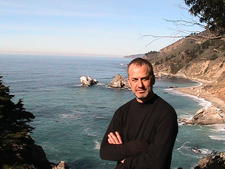We’re delighted that Bruce Braun will be presenting the 2013 Antipode RGS-IBG Lecture on Wednesday 28th August between 16:50 and 18:30 in the Ondaatje Theatre. The lecture will be followed by a drinks reception between 18:45-20:00 in the Map Room. Our colleagues at Wiley will be filming the lecture and will make it available as a part of our Lecture Series videos.
 Bruce is Professor of Geography, Environment and Society at the University of Minnesota. He is the author of The Intemperate Rainforest: Nature, Culture, and Power on Canada’s West Coast (University of Minnesota Press, 2002), and co-editor of Remaking Reality: Nature at the Millennium (Routledge, 1998) and Social Nature: Theory, Practice, and Politics (Blackwell, 2001) with Antipode‘s very own Noel Castree, and Political Matter: Technoscience, Democracy, and Public Life (University of Minnesota Press, 2010) with Sarah Whatmore. He is also one of the editors of the Annals of the Association of American Geographers and the new interdisciplinary journal Resilience: International Policies, Practices, and Discourses.
Bruce is Professor of Geography, Environment and Society at the University of Minnesota. He is the author of The Intemperate Rainforest: Nature, Culture, and Power on Canada’s West Coast (University of Minnesota Press, 2002), and co-editor of Remaking Reality: Nature at the Millennium (Routledge, 1998) and Social Nature: Theory, Practice, and Politics (Blackwell, 2001) with Antipode‘s very own Noel Castree, and Political Matter: Technoscience, Democracy, and Public Life (University of Minnesota Press, 2010) with Sarah Whatmore. He is also one of the editors of the Annals of the Association of American Geographers and the new interdisciplinary journal Resilience: International Policies, Practices, and Discourses.
Bruce’s lecture is provisionally entitled ‘Ecologies Beyond Capital and State‘ and sounds superb:
The advent of the Anthropocene may be significant less for ushering in the end of dualist conceptions of nature and society, than for the return of nature as natura naturans, and the appropriation of natural processes as both object and means of administration and accumulation. In this talk I delve into the language of non-linear and complex adaptive systems, and trace new modes of government and financial instruments that seek to govern through or capitalize upon system dynamics, from new forms of urban planning to weather derivatives to ecosystem services. The point in doing so is threefold: [i] to push at the analytical and political limits of the current geographical literature on ‘neoliberal natures’, and to explore alternative understandings of the relation between ecology, capital and state more alive to intensive difference and the struggle of capital and state to capture, harness or direct it; [ii] to begin to take account of how new materialisms might complement rather than challenge historical materialism; and [iii] to consider the analytical and political possibilities opened up (or foreclosed) by taking the language of non-linear and complex adaptive systems seriously. The talk builds on a key question: If the intensive difference of complex systems is what capital increasingly seeks to capture, what is an adequate analytical and political response? Where might we look for conceptual tools to understand this historical moment?
We’ll have an updated title and abstract from Bruce soon, as well as a virtual issue of Antipode on nature and society, materialisms ‘new’ and ‘historical’, and neoliberal natures.
In the meantime check out this invitation to an ‘open space’ during the conference from our colleagues in the Participatory Geographies Research Group (note the clash though!):
Wednesday 28th August, 3-6pm, UCL Department of Geography (Room G07, Pearson Building, Gower Street, London, WC1E 6BT)
Please let us know if you plan to participate, and especially if you would like to join us for a pub meal after the session – Sam Halvorsen [email protected]
In this session the Participatory Geographies Research Group (PyGyRG) would like to invite all conference attendees and RGS research group members to discuss ways forward from the current juncture of university reform and restructuring; and the broader interrelated challenges brought about as a consequence of the wider contexts of political and socio-economic crises. In particular, PyGyRG welcomes discussions around the themes of our ‘communifesto’ which was developed as a response to the increasing marginalization, exploitation, anxiety and stress wrought by these current transformations:
Communifesto for Fuller Geographies – https://antipodeonline.org/2012/10/15/symposium-on-the-participatory-geographies-research-groups-communifesto-for-fuller-geographies-towards-mutual-security/
Responses to the Communifesto – https://antipodeonline.org/2012/12/17/symposium-on-pygyrgs-communifesto-for-fuller-geographies-authors-reply-to-critical-responses/
Through this session, we would like to engage with other research groups to consider how this ongoing process is relevant to them and the extent to which their members are involved, or feel they would like to be, in the tactics and strategies outlined within the communifesto. Here-in we would like to highlight the following issues for discussion, and welcome further points:
- Possible spaces for mutual aid, and strategies we can share for securing our own and Geography’s relevance and futures;
- The effects of ‘widening participation’ agendas that are currently being subsumed within neoliberal discourse;
- The positive and negative influence of ‘impact’ factors, and what these mean vis-a-vis participatory approaches to research, teaching, and the future of academia;
- The increasing consumerisation of the student body – what are the impacts of treating students as ‘customers’ and degrees as tools to improve ‘’employability’?; and
- Ways of grappling with these issues in ‘creative’ ways, opening out our ‘strategies and tactics’ into playful and emotionally re-energizing opportunities, to find a way out of the trapped and tired positions that many communifesto respondents articulated.
With this platform for discussion we hope to move away from difficulties of closed conversations and an inward looking politics that has troubled social movements and radical scholars in the past. But most of all we hope to create greater connectivity, creativity and hope within and beyond academia.
Contact Sam Halvorsen ([email protected]) and/or Myfanwy Taylor ([email protected]) for further directions to the session or any other inquiries.
Reblogged this on Progressive Geographies and commented:
Bruce Braun to give the Antipode lecture at the upcoming RGS-IBG conference.
Reblogged this on Rashid's Blog.